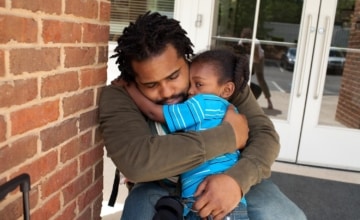In 2021, there were over 11 million infants and toddlers in the United States—equaling 3.5% of the country’s population. Almost 63% of these children had mothers who were active in the workforce (Keating, 2021). For many young families in the United States, there are very few authentic child care options that meet child and family needs, are affordable and are local.
Approximately half of families who want to access child care find it excessively difficult or impossible to secure licensed child care (Schochet, 2019). Access to high-quality infant-toddler child care is out of reach for the 40% of babies born to households with low-income (Keating, 2021), a disproportionate number of whom are babies of color (Pizarek, 2021).
A strong public-private partnership and focus on racial and health equity in Minnesota has allowed for expansion of an innovative approach to supporting FFN providers across the state. Since 2018, the Blue Cross and Blue Shield of Minnesota Foundation (Blue Cross Foundation) has provided philanthropic funding to establish and maintain FFN networks in underserved communities. These FFN networks are housed in established organizations (such as immigrant resettlement agencies, community collaboration programs, and charter schools) that have historic and cultural roots in the communities they serve and where they are able to sustain trusting relationships with providers and families. Historically, network members have provided an assortment of resources and supports such as culturally appropriate and easy-to-access trainings on various topics around early childhood, lending library kits for families at home, safety equipment such as cupboard latches and outlet protectors, a trusted website where FFN providers can access early childhood and COVID-19 information, resources and tools, support to FFN providers seeking to start FCC businesses through training assistance, business planning, connection to financial resources, paperwork completion, and early childhood best practices consultation. The networks have also worked to build relationships to support understanding and support for FFNs with local institutions, such as superintendents, local school boards, city mayors and councils. In the past several years, Minnesota’s early childhood advocates and stakeholders, including the Blue Cross Foundation, have been increasingly vocal about the need for the state to re-prioritize FFN providers. As a result, when MN received its 2020 CARES Act appropriation, $1 million was directed to provide support for FFN providers. The financial support was granted out to agencies to provide direct outreach, training and materials supports to FFN providers, prioritizing organizations serving the Somali, Latinx, Hmong, African American, American Indian and immigrant communities.
Finally, the Department of Health Services was able to use information gathered from the FFN Learning Community to direct an additional $4.5M from Coronavirus Response and Relief Supplemental Appropriations Act and American Rescue Plan Act funds to further development of FFN networks. In addition to expanding networks and support, this funding will allow for a new state project manager who will be dedicated to the orchestration of these supports. The state will also be conducting an FFN provider marketing and outreach campaign and a statewide FFN evaluation and landscape analysis.
To read more about state strategies to strengthen home based child care read here




